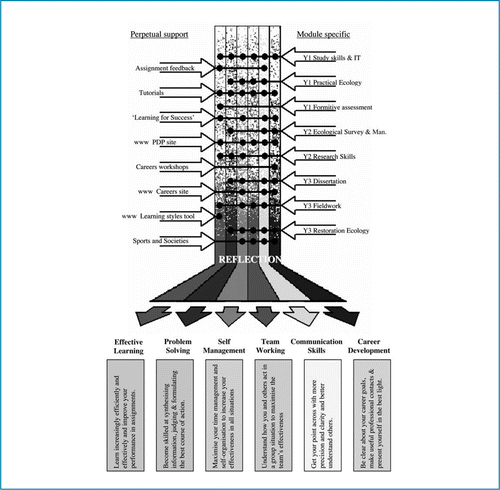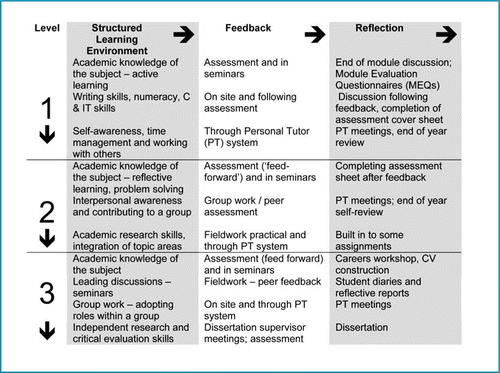Abstract
Personal Development Planning (PDP) is a process whereby an individual reflects on their own learning or achievement and the plans accordingly for their personal / educational / career development. It has been introduced in a variety of forms across the sector. At the University of Central Lancashire (UCLAN) the approach can be considered at four levels: Institution; Faculty; Department; and Course. Efforts have been made for Departments to take ‘ownership’ of their own approaches. Crucial to this has been engaging staff in designing-in PDP down to course level. The result is a model in which PDP is embedded within and relates directly to the uniqueness of individual courses.
Introduction
The PDP agenda is one which different institutions have approached in different ways. A good source of material is provided in SEDA (Staff and Educational Development Association) paper 115, Personal Development Planning (CitationGosling, 2003). In addition, entering the PDP discussion list (at [email protected]) shows the range of issues being discussed, including whether and how PDP should be assessed, how to encourage reflection, how best to keep portfolios. Although a variety of systems can be put in place, the crux is getting both students and staff to engage. Pauline Kneale’s article in issue 13 of Planet identifies employability as a tool for engaging students, although even the innovative use of PDP materials from ‘real’ companies may not engage students in their first year. The article does also identify the recurring issue of how to embed any such material and approach into the curriculum.
At UCLAN, my role as one of the Faculty teaching and learning co-ordinators, while retaining a proportion of time in the School of Natural Resources, has allowed me to have a view of and input to PDP at different levels — University, within the Faculty of Science, and across the School of Natural Resources. This article describes some steps in the process of introducing PDP, and identifies the importance of engaging staff in making a difference to the student experience.
University
Early in the process it was decided not to pursue a ‘single’ model for the whole University, but that Departments should devise their own schemes. Through delivering numerous workshops to varied groups of staff on the topic I have encountered a range of awareness and of practice. Many staff are still slightly bemused, and are under the impression that this is ‘something more to do’. Fortunately the question ‘What is PDP?’, and the request to just ‘Tell us what to do’ are now less frequently heard.
Workshops and discussions have emphasised the fact that the essentials of PDP are reflection and planning, and that much of the ‘basics’ are there already. When given the chance to illustrate what is happening in their Departments, using flip chart paper and pens, staff soon realise that this is indeed the case, but that what is needed is a more ‘overt’ way of drawing attention to what is being done, and to ‘actively’ reflect.
Opportunities for reflection are less well embedded. We must recognise the challenge faced in expecting staff to be able to facilitate reflection. It is not something that comes easy to most academics; indeed, when marking assignments on our PGCert in Teaching and Learning in HE, I invariably find that it is the refletive element which is most limited.
UCLAN has produced a set of documents which can form a starting point for self-analysis. However, as with all aspects of PDP, the system must be supported, i.e. involve both student and tutor.
Faculty
After consultation, it was recognised that, as at University level, an overall Faculty ‘model’ could be contrary to the ethos of PDP, which is that it is the process rather than the content which is important. We have therefore carefully identified certain ‘elements’ as the ‘core’ of PDP. It is then for Departments to determine how they fit these into their own strategies and procedures. Shown below are these elements, with a brief description.
Self-awareness — of strengths and under-used skills e.g. time management.
Reflection — to be undertaken at appropriate junctures e.g. following return of assignments with feedback, or at the end of year with personal tutor. An element of refection can be built-in as one criterion for selected assignments.
Action planning — a crucial part of implementing change; this might be built into a skills module, or in some cases be a role for personal tutor involvement.
Team / group work — able to recognise one’s role and behaviour within a group and to contribute appropriately. This requires staff to be able to give guidance and feedback on ‘performance’, which for many staff is not a trivial undertaking.
Career planning - market awareness, applications, presentations, interviews, CV writing.
School of Natural Resources
Meanwhile in the School of Natural Resources (encompassing what was previously Environmental Management, Forestry and Agriculture) a major review of HE provision has allowed a more detailed and individualised approach. A School learning and teachving guide ‘Learning for Success’, sets out generic elements to PDP. These are:
Personal tutor
Study skills module, which introduces concepts, exercises, and reflection as an assignment.
An on-line learning styles tool
Link to the University PDP site
Opportunities for reflection built into modules
Careers workshops during induction week
An on-line careers module, developed with the Society for Experimental Biology
During review, this framework was developed into a learning strategy with clearly articulated statements relating to PDP at each level.
At level 1 You should also identify effective strategies for selfdevelopment and study methods that are efficient and effective for yourself. Particularly within the Study Skills and I.T. module but in other modules as well, you will have the chance to develop further a wide range of relevant graduate skills such as, oral and written communication, presentation skills, and personal development planning. Your personal tutor will also be closely involved in PDP. You should keep a record of where and how you have developed relevant skills.
At level 2. Level 2 is probably the most important year in determining the outcome of your degree. The consolidation of subject knowledge, the development of learning skills, as well as developing further personal skills such as self-motivation and organisation will lay the foundation for success in your final year. Along with a more independent approach to learning, you should focus your personal development on career planning, taking advantage of careers workshops and on-line careers materials. You should ensure that you can provide evidence of the range of skills you’ve developed, either directly in a progress file, or by giving details in your developing CV.
Courses
As part of the review process, staff were asked to ‘illustrate’ PDP for their subject area, literally on flip chart. This in turn has allowed a structure for PDP to be drawn for each subject, which now appears in course handbooks. Two examples are given below.
BSc Ecology (courtesy of Dr C. Moffatt)
If you make the most of the PDP support throughout your degree, you will develop skills that employers these days particularly seek. Many application forms ask you to give examples which demonstrate when you used various skills like team-working, effective communication and problem solving. Having engaged fully with the PDP process, you will be in a much better position to give good examples and so make your application stand out.
BSc Geography (courtesy of Dr M. Toogood)
It’s possible to identify three main ‘vehicles’ through which PDP is supported in Geography. The first is the Structured Learning Environment, this might be a lecture, a workshop or a seminar, or fieldwork. The second important element is Feedback, responses from your lecturers and other students that let you know how successful you have been at learning and developing as a geographer (and as an individual). The final very important element is Reflection. This is the process of you thinking through and understanding how and why you have developed and learned as you did - what you have done well and what needs further work.
Conclusion
Introducing and embedding PDP is not something that comes naturally to those working in science-based disciplines. Guidance can only be provided to a certain level. However, there is general acceptance of the validity and worth of PDP, and if staff are allowed to take ownership of the situation, to treat it as a ‘problem’ to be solved, creative solutions can arise.
References
- KnealeP. (2004) Motivating student personal development planning by making links with employability, Planet, 13: pp. 20-21
- GoslinD. (2003) Personal Development Planning. Staff and Educational Development Association (SEDA) paper 115: SEDA

